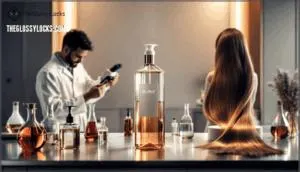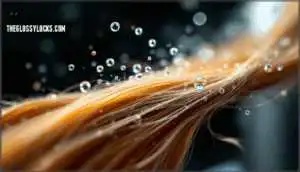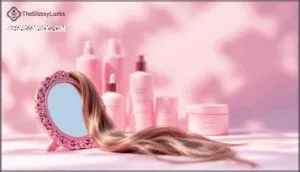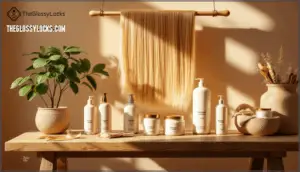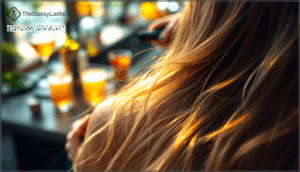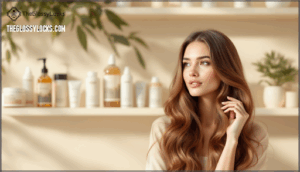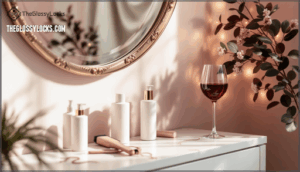This site is supported by our readers. We may earn a commission, at no cost to you, if you purchase through links.
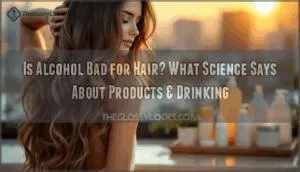
Whether you’re scrutinizing product labels or wondering if your weekend drinks are thinning your hair, understanding which alcohols help and which harm makes all the difference in protecting your strands from the inside out.
Table Of Contents
- Key Takeaways
- Is Alcohol Bad for Hair?
- How Alcohol in Hair Products Affects Hair
- Which Alcohols Are Harmful to Hair?
- Which Alcohols Benefit Hair Health?
- Does Drinking Alcohol Damage Hair?
- Can Alcohol Consumption Lead to Nutrient Deficiencies?
- How to Choose Hair Products With Alcohols
- Tips for Maintaining Healthy Hair With Alcohol Use
- Frequently Asked Questions (FAQs)
- Is alcohol bad for hair & scalp?
- What are the effects of alcohol on the eyes?
- What happens if you use alcohol in hair products?
- Is alcohol in hair care good or bad?
- Does alcohol cause hair loss?
- Is drying alcohol good or bad for your hair?
- Are there bad alcohols in hair products?
- Do alcoholic products affect your skin & hair?
- Is alcohol good for hair?
- How long until hair recovers from alcohol damage?
- Conclusion
Key Takeaways
- Not all alcohols harm hair—short-chain alcohols (ethanol, isopropyl) strip moisture and cause brittleness, while fatty alcohols (cetyl, stearyl, cetearyl) actually hydrate strands and smooth cuticles.
- Drinking alcohol disrupts hair growth by causing dehydration, triggering nutrient deficiencies (biotin, iron, zinc drop by 40-50%), and increasing oxidative stress that pushes follicles into premature shedding phases.
- Product selection matters more than alcohol avoidance—look for formulas where drying alcohols appear low on ingredient lists or are balanced with conditioning fatty alcohols and deep treatment masks.
- Hair damage from topical alcohol products can reverse within weeks with proper moisturizing treatments, but internal damage from chronic drinking requires months of nutritional correction and sustained lifestyle changes before regrowth appears.
Is Alcohol Bad for Hair?
The word "alcohol" on your shampoo bottle doesn’t tell the whole story—some alcohols strip your hair dry while others are actually conditioning superstars. Think of it like this: calling all alcohols "bad" is like saying all fats are unhealthy. In product formulation, alcohols serve wildly different purposes depending on their molecular structure.
Not all alcohols are hair villains—short-chain types strip moisture while fatty alcohols actually condition and protect your strands
Short-chain types—those quick-drying alcohols—can compromise scalp health and leave your strands brittle. Meanwhile, fatty alcohols actually improve hair health by locking in moisture and smoothing the cuticle. The effects of alcohol on hair depend entirely on which type you’re dealing with.
Then there’s the drinking side of things. Alcohol consumption affects hair nutrition from the inside out, potentially triggering deficiencies that slow growth and weaken strands. So when you’re asking "is alcohol bad for hair," you’re really asking two separate questions—one about what’s in your products, and another about what’s in your glass. Both deserve careful attention, but for completely different reasons.
How Alcohol in Hair Products Affects Hair
When you scan a haircare label and see "alcohol" listed, it’s not a straightforward red flag—context matters here. The type of alcohol in your product determines whether it’s helping or hurting your hair.
Let’s break down how different alcohols work and what they mean for your strands.
Short-Chain Vs. Long-Chain Alcohols
Think of alcohols in haircare like siblings in a family—some are helpful around the house, while others create chaos wherever they go. The key difference in alcohol chemistry comes down to molecular structure:
- Short-chain alcohols evaporate quickly and strip moisture balance from your hair
- Long-chain alcohols (fatty acid alcohols) actually nourish and protect hair porosity
- Bad alcohols like ethanol can compromise scalp health when overused
- Good alcohols like cetyl alcohol support hydration and manageability
Understanding this distinction helps you choose products that work with your hair, not against it.
Common Alcohols Found in Haircare
When you scan product ingredient labels, you’ll encounter several alcohol types with distinct effects on hair texture and scalp health. Ethanol appears as "Alcohol Denat." or "SD Alcohol 40" in sprays and volumizers—these evaporate fast but strip moisture. Meanwhile, cetyl alcohol, stearyl alcohol, and cetearyl alcohol are fatty alcohols that actually hydrate and smooth your strands.
Benzyl alcohol works as a preservative, while isopropyl alcohol disperses fragrances at low concentrations in many formulations. Understanding the role of good alcohols is essential for maintaining healthy hair.
Misconceptions About Alcohol in Products
Most people think all alcohols damage hair, but that’s far from the truth—it’s the type of alcohol that matters, not the word itself. These alcohol myths confuse product labels, making you toss out perfectly good formulas that contain beneficial fatty acids.
Here’s what you need to know about cosmetic formulation:
- Fatty alcohols (like cetyl and stearyl) actually improve hair texture by locking in moisture
- Short-chain alcohols in well-balanced formulas won’t necessarily wreck your strands
- Alcohol in hair products fulfills multiple purposes—preservation, texture, and delivery
- Reading product labels means looking at concentration and context, not just spotting the word "alcohol"
Understanding these distinctions helps you make smarter choices about alcohol in haircare without falling for oversimplified warnings.
Which Alcohols Are Harmful to Hair?
Not all alcohols are created equal, and the ones that cause problems share a common trait: they’re small, fast-evaporating molecules. These short-chain alcohols strip moisture from your hair shaft faster than you can say "frizz ball," leaving strands dry and vulnerable.
Here’s what you need to watch out for when reading labels.
Effects of Short-Chain Alcohols
Short-chain alcohols act like tiny evaporators—they zip in, strip moisture, and vanish quickly. This rapid evaporation occurs because these molecules have fewer carbon atoms, which allows them to pull moisture out as they dry. The result is increased hair porosity, leaving strands more vulnerable to breakage. You may also notice scalp irritation, especially with daily use of styling sprays. Unlike fatty acid-based alcohols that hydrate, short-chain alcohols in haircare products lead to moisture loss that compounds over time. The effects of alcohol on hair become evident through increased frizz and brittleness—clear signs that alcohol and hair care products aren’t compatible. Understanding the impact of hair health science is essential for making informed decisions about hair care products.
| Short-Chain Alcohol | Primary Effect | Risk Level |
|---|---|---|
| Ethanol (Alcohol Denat) | Rapid moisture stripping | High |
| Isopropyl Alcohol | Cuticle roughness | High |
| Propanol | Scalp dryness | Moderate |
| SD Alcohol 40 | Evaporative drying | High |
| Denatured Alcohol | Oil removal | High |
Dryness, Frizz, and Hair Damage
When short-chain alcohols become a daily habit in your routine, your hair pays the price through a cascade of damage that starts at the cuticle and works its way inward.
Hair moisture evaporates faster than your follicles can replace it, triggering chronic hair dryness. The visible aftermath? Uncontrolled frizz, dry scalp irritation, and hair breakage that progresses into split ends.
Without proper hair hydration, alcohol and hair care products create cumulative hair damage that weakens your strand structure from the outside in.
Identifying Bad Alcohols on Labels
Reading ingredient labels feels like decoding a chemistry exam, but spotting drying alcohols doesn’t require a science degree—just knowledge of a few telltale names. Look for Alcohol Denat (denatured alcohol), ethanol, isopropyl alcohol, and propanol near the top of ingredient lists—that’s where cosmetic chemistry meets product safety concerns.
These alcohol types in hair care signal potential dryness, so understanding types of alcohol in hair care transforms label reading from guesswork into informed choices about alcohol in hair products.
Which Alcohols Benefit Hair Health?
Not all alcohols strip your hair—some actually work to strengthen and hydrate it. Fatty alcohols, the "good" category, function completely differently than their drying counterparts.
Let’s look at which ones you want to see on your product labels.
Fatty Alcohols and Their Functions
Fatty alcohols—think cetyl, stearyl, and cetearyl alcohol—work like emollients in your hair care formulas, binding moisture to the hair shaft while smoothing down the cuticle layer.
They’re derived from plant sources and function as thickening agents that give conditioners their luxurious texture.
These nourishing effects come from their ability to create a protective barrier that locks in hydration without weighing your hair down.
Moisturizing and Detangling Properties
Your hair shaft has an outer cuticle made of overlapping scales. When those scales lie flat, your hair feels silky and moves freely, but when they’re raised and rough, you get tangles and that frustrating snag-and-pull feeling.
Fatty alcohols smooth those cuticle layers down, restoring moisture balance while creating slip that makes detangling methods actually work. They deliver hair hydration without the greasy residue you’d get from heavier oils.
That’s why alcohol in hair products isn’t always the enemy—these fatty acid derivatives in hair treatment formulas actually support hair softening and proper hair moisturizing.
Examples of Good Alcohols
If you’re scanning ingredient labels wondering which alcohols deserve a spot in your routine, let’s start with the MVPs—cetyl alcohol, stearyl alcohol, and cetearyl alcohol. These long-chain fatty alcohols act as healthy hydrators, creating gentle formulas that condition without stripping.
Behenyl alcohol and myristyl alcohol are other nourishing ingredients you’ll find in hair moisturizers, delivering the benefits of fatty alcohols without the drying effect of their short-chain cousins.
Does Drinking Alcohol Damage Hair?
We’ve talked about alcohols in your products, but what about the drinks in your hand?
The relationship between alcohol consumption and hair health isn’t always straightforward, but there are some clear connections worth understanding. Let’s look at how drinking affects your hair from the inside out.
Dehydration and Hair Texture
Alcohol acts like a sponge in your bloodstream, pulling water from every cell it touches—and your hair follicles feel it first. When dehydration disrupts moisture balance, you’ll notice:
- Strands losing their natural elasticity and bounce
- Texture change from smooth to straw-like
- Increased breakage along weakened shafts
- Scalp health declining with reduced sebum production
- Hair dryness intensifying with each drink
Your hydration levels directly dictate whether your hair thrives or just survives.
Alcohol’s Impact on Hair Growth
Beyond dehydration’s surface effects, chronic drinking disrupts the growth cycle itself. Alcohol metabolism floods your system with reactive oxygen species—those cellular troublemakers that trigger oxidative stress in hair follicles. This toxic cascade damages the delicate cells orchestrating growth, pushing more follicles into premature resting phases while nutrient deficiencies starve the regeneration process.
Heavy drinkers face a 40% higher risk of androgenetic alopecia—and that’s not coincidence.
| Alcohol’s Effect | Impact on Hair Growth |
|---|---|
| Oxidative stress increases by 30% | Follicle cells age faster, disrupting cycles |
| Vitamin B absorption drops 50% | DNA synthesis in follicles weakens |
| Zinc deficiency affects 40% of heavy drinkers | Keratin production falters |
| Reduced protein metabolism | Hair shafts grow weaker, thinner |
Hair Loss and Thinning
When those growth disruptions compound over months, you don’t just see slower hair—you start losing it. Alcohol consumption weakens hair follicles, triggering thinning causes like telogen effluvium, where follicles shed prematurely instead of supporting hair regrowth.
Chronic drinking accelerates balding patterns through compromised scalp health, with hair loss visible along your part lines and temples first.
Can Alcohol Consumption Lead to Nutrient Deficiencies?
Here’s the thing about drinking: it doesn’t just affect how you feel the next morning. When alcohol becomes a regular habit, it quietly interferes with how your body absorbs and uses the nutrients your hair desperately needs to grow strong.
Let’s look at three key deficiencies that can turn healthy hair into a struggle.
Biotin, Iron, and Zinc Deficiency
Heavy drinking doesn’t just dehydrate you—it sets off a chain reaction of nutrient absorption problems that directly impact your hair follicle health. Chronic alcohol use can slash vitamin B absorption by up to 50%, affecting biotin levels vital for keratin production.
Around 40% of chronic drinkers develop zinc deficiency, while iron-deficient states become common, triggering telogen phase shedding. These nutrient deficiencies disrupt mineral balance and create deficiency symptoms like thinning and breakage—issues that dietary supplements alone may not fully correct without addressing alcohol intake.
Protein Metabolism and Hair Strength
Protein synthesis acts as the construction crew for your hair shaft, and alcohol basically fires the workers midway through the job.
Chronic drinking disrupts amino acid balance, starving follicles of the building blocks they need for keratin structure. Without adequate protein intake and proper nutrient absorption, your hair shaft weakens from the inside out—imagine trying to build a house with half the materials.
Vitamin Absorption and Hair Health
Your body treats vitamins like a delivery system—and alcohol is the thief stealing packages off your follicles’ doorstep. Here’s what alcohol metabolism disrupts regarding nutrient balance:
- Vitamin B absorption drops by 50%, starving hair follicles of folate and B12 needed for DNA synthesis
- Fatty acids become depleted, weakening the lipid barrier that protects your scalp
- Nutrient deficiencies stack up over time, triggering visible changes in hair health and care
How to Choose Hair Products With Alcohols
Not all alcohols are created equal, and knowing which ones to embrace or avoid can save your hair from unnecessary damage. The key lies in reading ingredient labels and understanding how different alcohols work within a product’s overall formula.
Let’s look at what actually matters when you’re scanning those bottles in the haircare aisle.
Balancing Alcohol Types in Haircare
The trick to smart haircare isn’t avoiding all alcohols—it’s knowing which ones to embrace and which ones to limit based on your hair’s current needs.
Start by scanning product labels for context: if you see Alcohol Denat high up the list in a styling spray, balance it with a leave-in conditioner rich in fatty alcohols like cetyl or stearyl alcohol.
Your hair texture and moisture level should guide your alcohol formulation choices—dry, curly types benefit from fatty acid-rich products, while oily hair can tolerate small amounts of drying alcohols in hair products without damage.
Recommended Product Types
Leave-in conditioners, hair masks, and cream-based stylers give you the best shot at loading up on those nourishing fatty alcohols while keeping the drying ones in check. Here’s what to reach for:
- Moisturizing shampoos and nourishing conditioners with cetyl or stearyl alcohol protect your hair’s natural moisture barrier
- Hair masks loaded with fatty alcohols deliver intensive hydration when your strands need serious repair
- Leave-in products and styling creams offer continuous conditioning without the harsh, evaporative alcohols that strip moisture away
Understanding hair product ingredients helps you choose hair care products that actually work with your hair, not against it.
Tips for Maintaining Healthy Hair With Alcohol Use
Whether you’re reaching for styling products or a glass of wine, your hair doesn’t have to suffer.
The good news is that you can protect your strands with a few smart habits that address both topical and internal alcohol exposure.
Let’s look at three practical strategies that’ll keep your hair healthy, hydrated, and resilient.
Limiting Harmful Alcohol Exposure
If you’ve been loading up on styling gels and hairsprays without checking labels, you might be unknowingly stripping moisture from your strands with every application. Start reading ingredient lists carefully—when you spot Alcohol Denat or isopropyl alcohol in the first five ingredients, consider swapping for alcohol-free products or gentle formulations with balanced moisture content.
Here’s a quick guide to protecting your scalp and maintaining moisture balance:
| Product Type | What to Look For |
|---|---|
| Styling Products | Alcohol-free formulas or fatty alcohols (cetyl, stearyl) |
| Hair Masks | Deep conditioning treatments with ceramides and oils |
| Daily Care | Leave-in conditioners with emollients for scalp protection |
When you can’t avoid short-chain alcohols entirely, balance them with weekly hair mask benefits—think deep hydration treatments that counteract any drying effects from alcohol in hair products.
Supporting Hair Through Nutrition
Think of your scalp as a garden—without the right nutrients in the soil, nothing thrives, no matter how carefully you water. When alcohol depletes key vitamins, your hair nourishment takes a direct hit, weakening everything from root to tip.
Focus on nutrient balance through these dietary needs:
- Protein-rich foods like eggs and lean meats rebuild keratin structure damaged by nutrient deficiency
- Healthy oils from salmon and avocados deliver omega-3s that support skin and hair nutrition
- Hair supplements with biotin, zinc, and iron restore vitamin intake levels chronic drinking diminishes
Hydration and Moisturizing Strategies
Beyond what you eat, water intake and external moisture create the one-two punch that keeps hair flexible instead of fragile.
This dual approach guarantees your hair hydration and moisture work together, protecting against alcohol’s dehydrating punch from both directions.
| Internal Hydration | External Moisture Balance |
|---|---|
| Drink 8-10 glasses daily to counteract drying effects | Apply deep conditioning treatments weekly for hair nourishment |
| Monitor urine color for proper hydration | Use leave-in products with natural oils like argan or jojoba |
| Increase water during alcohol consumption | Seal cuticles with fatty alcohol-based hair care products |
| Pair hydration with electrolytes | Control humidity damage with anti-frizz serums |
| Track intake if hair feels brittle | Layer moisture—lighter to heavier products |
Frequently Asked Questions (FAQs)
Is alcohol bad for hair & scalp?
It sounds almost unbelievable, but alcohol isn’t automatically the villain in your hair care routine. Short-chain alcohols dry out your scalp and strands, while fatty alcohols actually boost hair hydration and protect against damage.
What are the effects of alcohol on the eyes?
Chronic drinking interferes with tear production, causing Dry Eyes and Eye Irritation. Alcohol consumption may trigger Eye Strain, Vision Blur, and potentially Corneal Damage—similar to how alcohol intake affects hair health through dehydration.
What happens if you use alcohol in hair products?
Alcohol in hair care products affects your hair differently depending on formulation and ingredient interactions. Short-chain alcohols can increase hair porosity and strip moisture, potentially causing hair damage.
Meanwhile, fatty alcohols actually improve scalp health and boost product performance.
Is alcohol in hair care good or bad?
It’s not black and white—alcohols split into two camps. Short-chain types (like ethanol) strip hair moisture and trigger hair damage, while fatty alcohols (cetyl, stearyl) deliver alcohol benefits through hair nutrition and scalp health support via fatty acids, proving cosmetic science knows hair care nuance.
Does alcohol cause hair loss?
Heavy drinkers face real risk: chronic consumption disrupts nutrient absorption—particularly biotin, iron, and zinc—which weakens hair follicles and can trigger hair thinning.
Dehydration compounds these scalp health issues, pushing more follicles into the shedding phase.
Is drying alcohol good or bad for your hair?
Studies show short-chain alcohols can strip up to 25% of your hair’s natural moisture within minutes. Drying alcohols evaporate quickly, disrupting moisture balance and raising hair porosity—which triggers frizz, brittleness, and scalp health concerns.
While useful in styling products for quick-drying effects, frequent exposure weakens strands over time.
Are there bad alcohols in hair products?
Yes—short-chain alcohols like ethanol and isopropyl alcohol strip moisture from your hair shaft, causing dryness and frizz. Meanwhile, fatty alcohols like cetyl alcohol actually nourish and condition your strands.
Do alcoholic products affect your skin & hair?
Like a splash of toner on sensitive skin, short-chain alcohols in hair care products can trigger skin irritation and scalp discomfort if you’re prone to alcohol sensitivity—especially around your hairline and scalp.
Is alcohol good for hair?
Certain types of alcohol in hair care products—specifically long-chain fatty alcohols like cetyl and stearyl—deliver genuine hair nourishment and moisture.
These gentle formulas support hair health by reducing frizz and detangling strands without the drying effects.
How long until hair recovers from alcohol damage?
Hair recovery time depends on the damage type and overall health. Topical alcohol damage might improve within weeks with proper moisturizing treatments, while hair loss from chronic alcohol consumption requires months of sustained detox, improved nutrition, and addressing deficiencies before new hair regrowth becomes visible.
Conclusion
Here’s what matters most: is alcohol bad for hair? It depends entirely on the type. Short-chain alcohols in styling products dry out strands over time, while fatty alcohols actually protect and condition.
Meanwhile, drinking alcohol weakens hair from within—dehydrating your scalp, depleting essential nutrients like biotin and zinc, and slowing growth cycles. The fix isn’t avoiding all alcohol; it’s knowing which ones to embrace in your routine and moderating what you consume. Your hair reflects what you feed it—and what you expose it to.
- https://www.silverridgerecovery.com/what-does-alcohol-do-to-your-hair/
- https://www.medicalnewstoday.com/articles/is-alcohol-bad-for-your-hair
- https://pure-elements-salon.com/blog/understanding-the-impact-of-chemicals-on-your-hair-and-scalp/
- https://hairgp.co.uk/alcohol-smoking-the-hair-loss-science-in-2025/
- https://miamihair.com/blog/alcohol-consumption-and-hair-loss/

